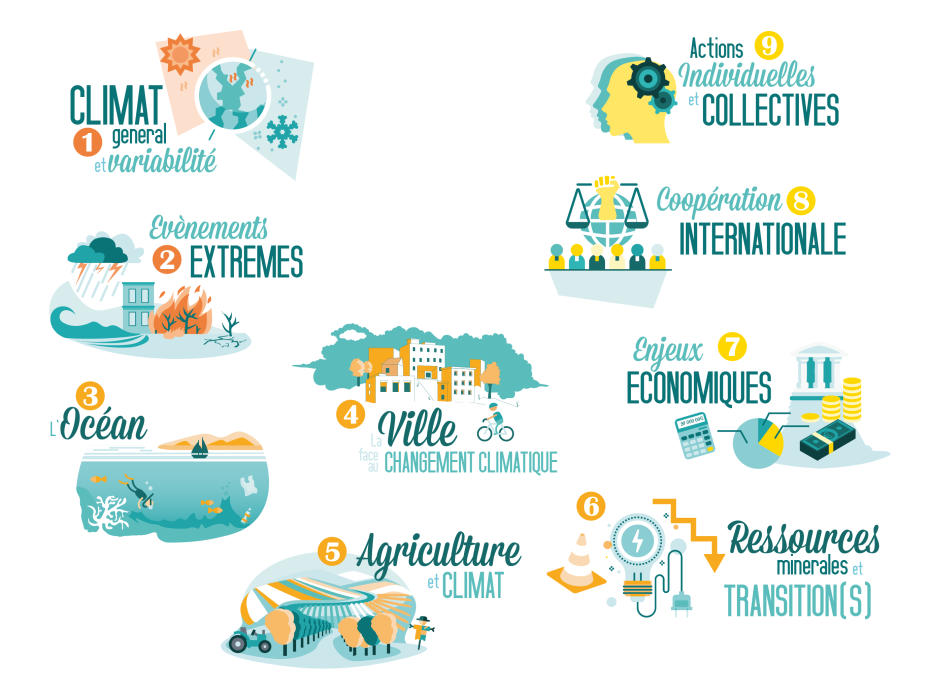Launch of the MOOC M@gistère Climate Change Understanding to act
An ITEM - Labex OT-Med project - in partnership with the Aix-Marseille Academy
An online training for all, which approaches the Climate Change from a new multidisciplinary angle.
A multidisciplinary MOOC for Understanding to Act
Climate Change, Global Warming, Climate Emergency, Climate Threat:Whatever the formula used to designate the global warming we are witnessing, it cannot be approached through one discipline alone, if we wish to grasp the magnitude of its challenges. This training course offers a multidisciplinary approach accessible to non-specialists . It provides the basis for a rigorous understanding of a phenomenon that is excessively complex in its effects: climate change is a global change. This training proposes to identify the multiplicity of issues and the complexity of interactions related to climate change based on updated scientific content. The most accurate understanding possible of what we are facing and what these changes may lead to should enable us to measure the share of responsibility, both individual and collective, that we have to assume and should guide us in the choice of decisions to be taken within a democratic framework. |

|
The M@gistère MOOC "Understanding in order to Act" is an online training course that approaches climate change from a new multidisciplinary angle. The climate, its history and its physical mechanismsare of course detailed, as well as its influence, sometimes extreme, on the main environments and sectors of activity: marine, agricultural and urban environments. The resulting economic issues and the need for international cooperation are also addressed. Finally, particular attention is paid to the construction of scientific facts in the face of persistent scepticism, to the psychological aspects that slow down or encourage action in the face of these upheavals, and to theimportance of a more circular society, based on a sober management of its resources. |
Who is this MOOC for?This MOOC is registered on the national platform for distance learning of the French Ministry of Education: M@gistère (similar to the FUN platform for MOOCs), it is intended for:
(*) subject to having a university email address. |
Who made this MOOC?This MOOC is the result of a close collaboration between the Laboratory of Excellence (LABEX) OT-Med (Objectif Terre - Bassin Méditerranéen), the Mediterranean Institute for Environmental Transition (ITEM) of Aix-Marseille Université and the Academy of Aix-Marseille. The content is in line with the national objectives of scientific culture and education for sustainable development The interdisciplinary scientific content was developed by 9 researchers, all members of Labex OT-Med or the ITEM Institute. From the physical mechanisms of the climate to legal and economic issues, including ocean acidification, extreme events, agricultural practices, urbanisation, the psychological drivers of action, the need to manage resources with sobriety, most aspects of climate change are addressed by the following scientific team: |
|
- General climate and variability: Joël GUIOT, Paleoclimatologist, CNRS Research Director - CEREGE (European Centre for Research and Teaching in Environmental Geosciences) - Director of Labex OT-Med - Extreme events: Vincent MORON, Geographer, Professor of AMU Universities - CEREGE (European Centre for Research and Education in Environmental Geosciences) - The ocean: Sandrine RUITTON, Oceanologist, Lecturer AMU - MIO (Mediterranean Institute of Oceanography) - Cities facing climate change: Hubert MAZUREK, geographer, Director of Research IRD LPED (Population Environment Development Laboratory) - Agriculture and climate: Alberte BONDEAU, geophysicist, CNRS Research Fellow - IMBE (Mediterranean Institute of Biodiversity and Marine and Continental Ecology) |
- Mineral Resources and Transition(s): Clément Levard, geochemist, researcher at CNRS - CEREGE (European Centre for Research and Teaching in Environmental Geosciences) - Economic issues: Olivier Chanel, economist, Director of Research CNRS - AMSE (Aix-Marseille School of Economics) - International Cooperation: Sandrine MALJEAN-DUBOIS, lawyer, Director of Research CNRS - DICE (International, Comparative and European Law) - Individual and Collective Actions: Alexandra SCHLEYER-LINDENMANN, psychologist, Senior Lecturer AMU - ESPACE (Study of Structures, Adaptation Processes and Changes in Space) |
The MOOC M@gistère "Climate Change - Understanding to Act" was officially launched during the climate week which opened on Monday, October 5, 2020, at the initiative of the Academy of Aix-Marseille. This week was introduced by Valérie MASSON-DELMOTTE, French paleoclimatologist, specialist in the reconstruction of past climates through the analysis of polar ice, research director at the Commissariat à l'énergie atomique et aux énergies alternatives (CEA) and co-chair of the group n° 1 of the Intergovernmental Panel on Climate Change (IPCC). Her conference "Climate change: causes and consequences for action" is accessible to all (see useful links)
Practicalities: how to register? Let us guide you
Introduction to Climate Week 2020 and MOOC M@gistère training by Valérie MASSON-DELMOTTE. Conference of October 05, 2020 "Climate change: causes and consequences to act": click on Introduction
TEASER of the MOOC M@gistère Climate Change - Understanding to Act: to come
IUCN World Congress 2021 (Campus): An operational digital educational platform: massive, updated, interactive.

